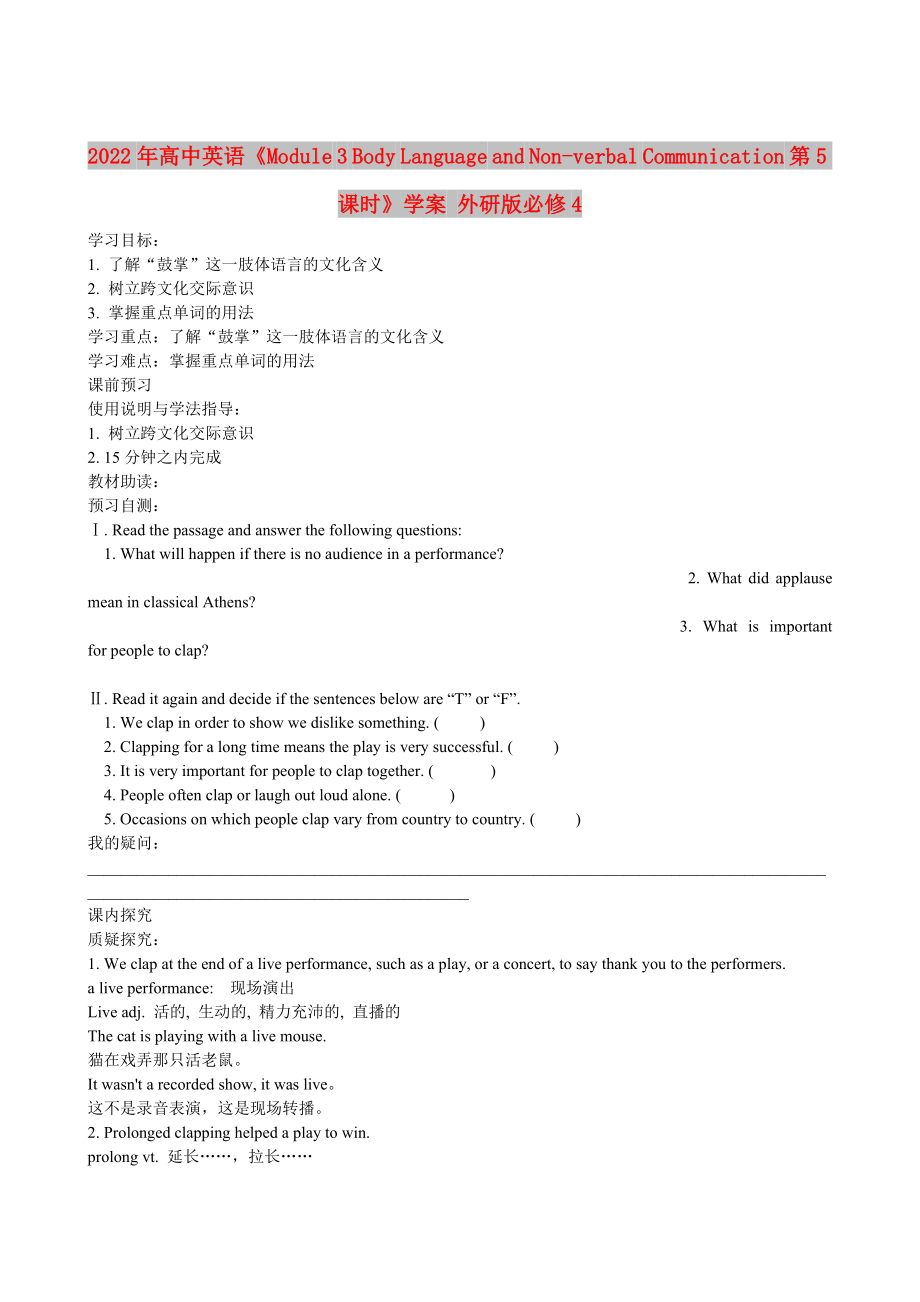《2022年高中英語(yǔ)《Module 3 Body Language and Non-verbal Communication 第5課時(shí)》學(xué)案 外研版必修4》由會(huì)員分享�����,可在線閱讀���,更多相關(guān)《2022年高中英語(yǔ)《Module 3 Body Language and Non-verbal Communication 第5課時(shí)》學(xué)案 外研版必修4(2頁(yè)珍藏版)》請(qǐng)?jiān)谘b配圖網(wǎng)上搜索���。
1����、2022年高中英語(yǔ)《Module 3 Body Language and Non-verbal Communication 第5課時(shí)》學(xué)案 外研版必修4
學(xué)習(xí)目標(biāo):
1. 了解“鼓掌”這一肢體語(yǔ)言的文化含義
2. 樹立跨文化交際意識(shí)
3. 掌握重點(diǎn)單詞的用法
學(xué)習(xí)重點(diǎn):了解“鼓掌”這一肢體語(yǔ)言的文化含義
學(xué)習(xí)難點(diǎn):掌握重點(diǎn)單詞的用法
課前預(yù)習(xí)
使用說明與學(xué)法指導(dǎo):
1. 樹立跨文化交際意識(shí)
2. 15分鐘之內(nèi)完成
教材助讀:
預(yù)習(xí)自測(cè):
Ⅰ. Read the passage and answer the following questions:
1. What
2�����、 will happen if there is no audience in a performance?
2. What did applause mean in classical Athens?
3. What is important for people to clap?
3�����、
Ⅱ. Read it again and decide if the sentences below are “T” or “F”.
1. We clap in order to show we dislike something. ( )
2. Clapping for a long time means the play is very successful. ( )
3. It is very important for p
4、eople to clap together. ( )
4. People often clap or laugh out loud alone. ( )
5. Occasions on which people clap vary from country to country. ( )
我的疑問:
_____________________________________________________________________________________________________________________________
5、_____________
課內(nèi)探究
質(zhì)疑探究:
1. We clap at the end of a live performance, such as a play, or a concert, to say thank you to the performers.
a live performance: 現(xiàn)場(chǎng)演出
Live adj. 活的, 生動(dòng)的, 精力充沛的, 直播的
The cat is playing with a live mouse.
貓?jiān)趹蚺侵换罾鲜蟆?
It wasn't a recorded show, it was live���。
這不是錄音表
6、演,這是現(xiàn)場(chǎng)轉(zhuǎn)播�����。
2. Prolonged clapping helped a play to win.
prolong vt. 延長(zhǎng)……��,拉長(zhǎng)……
3. mean doing 意味著做某事 mean to do sth 打算做某事
4. Applause was a sign of being part of the munity, and of equality between actors and audience.
equality: n. 同等,平等
例句與用法:
1. I do not believe in equality of capacity, bu
7�����、t I do believe in equality of opportunity.
我不相信能力均等�����,但我確實(shí)相信機(jī)會(huì)均等��。
2. Women are still struggling for true equality with men.
婦女仍在爭(zhēng)取與男人真正平等.
5. But some occasions on which people clap change from one country to another.
Occasion 時(shí)刻�, 時(shí)候�, 場(chǎng)合 on this/that occasion 此時(shí)/彼時(shí) on one occasion 有一次 I've m
8、et her on several occasions recently.我最近見到過她好幾次��。
時(shí)機(jī)���;機(jī)會(huì) This is not an occasion for laughter. 這不是笑的時(shí)候���。Occasion 做先行詞用when/on which 引導(dǎo)。 如:There are some occasions when people can’t express themselves freely. 人們?cè)谠S多場(chǎng)合下不能自由的表達(dá)自己���。
課后反思:
_______________________________________________________________
9�����、___________________________________________________________________________
課后訓(xùn)練
補(bǔ)全對(duì)話
A. I advise you B. Can I ask you a favor C. Take my advice
D. Can I offer you some advice E. How are you doing F. That’s hard to say
G. I hope you have a great time there.
A: Hello! Linda!
10����、___1_____?
B: Fine! I am wondering how I should spend my winter vacation.
A: ____2____?
B: Of course! What do you think I should go?
A: ___3___. What about Beijing?
B: I’ve been there before. Any other suggestion?
A: I suggest you go to Shanghai. I have a cousin there. She is a guide.
B: Wonderful! ___4____?
A: Certainly!
B: Can you ask give me the telephone number of your cousin? I hope she can help me go around Shanghai.
A: No problem! ____5____.
3060
 2022年高中英語(yǔ)《Module 3 Body Language and Non-verbal Communication 第5課時(shí)》學(xué)案 外研版必修4
2022年高中英語(yǔ)《Module 3 Body Language and Non-verbal Communication 第5課時(shí)》學(xué)案 外研版必修4

